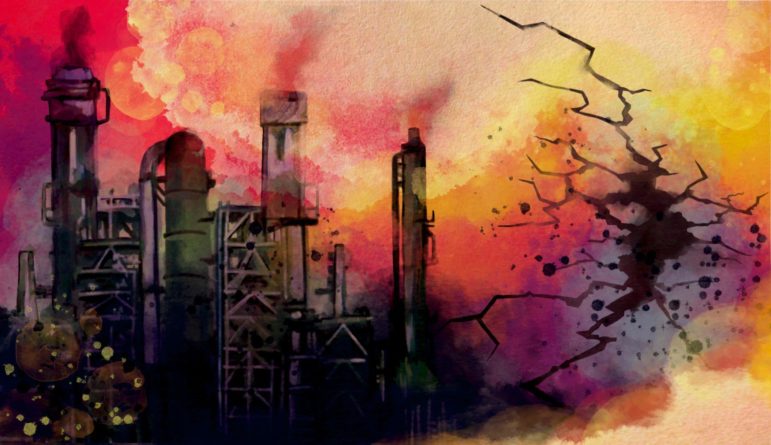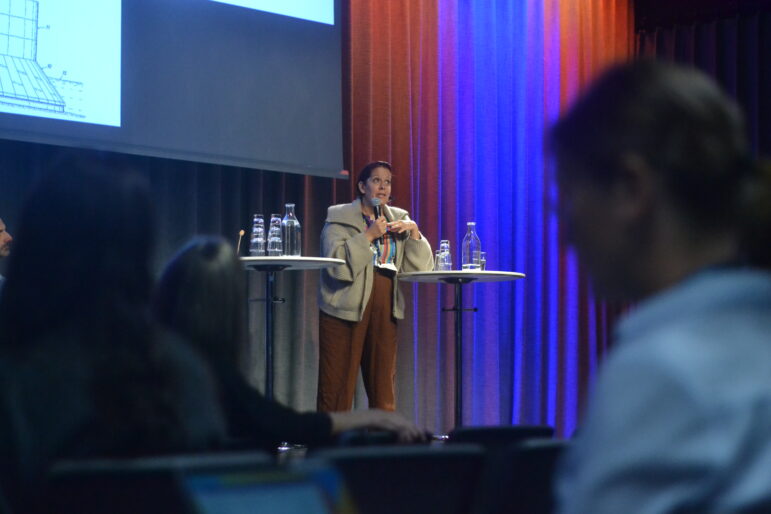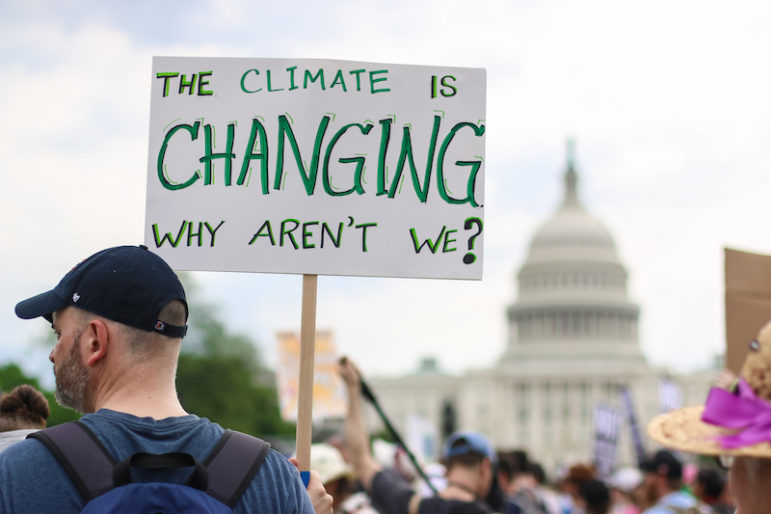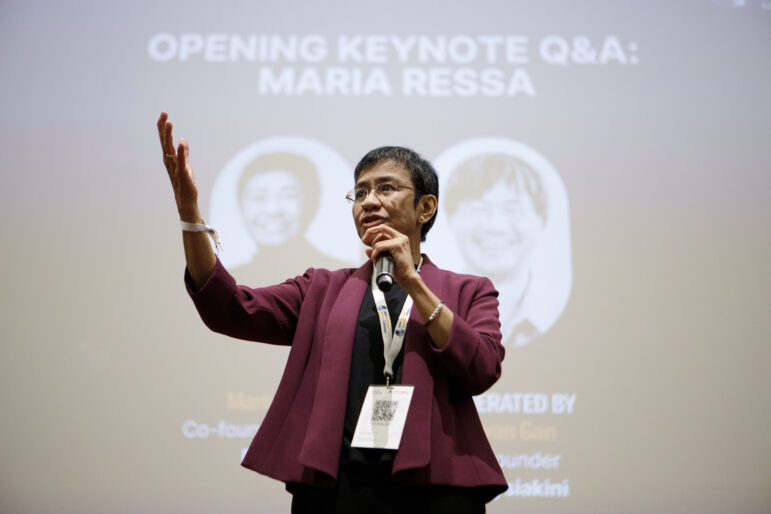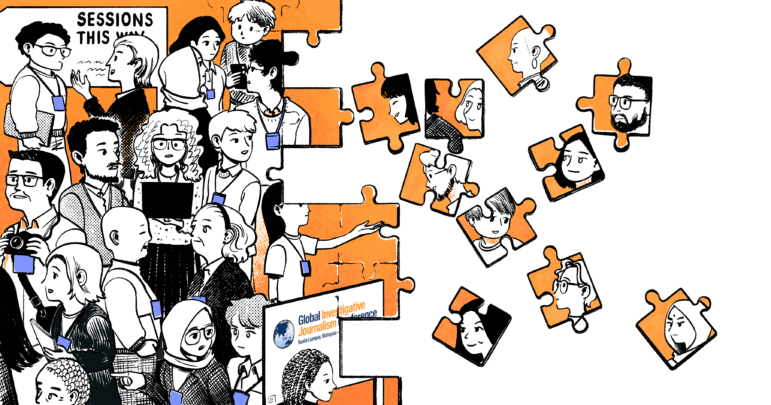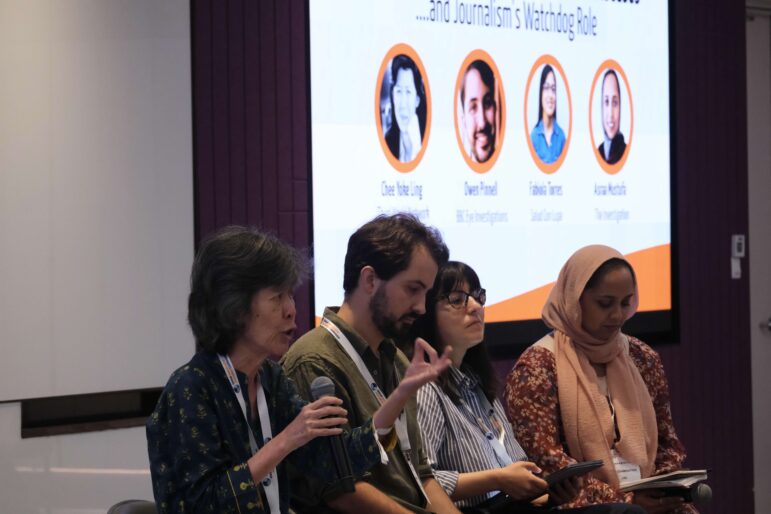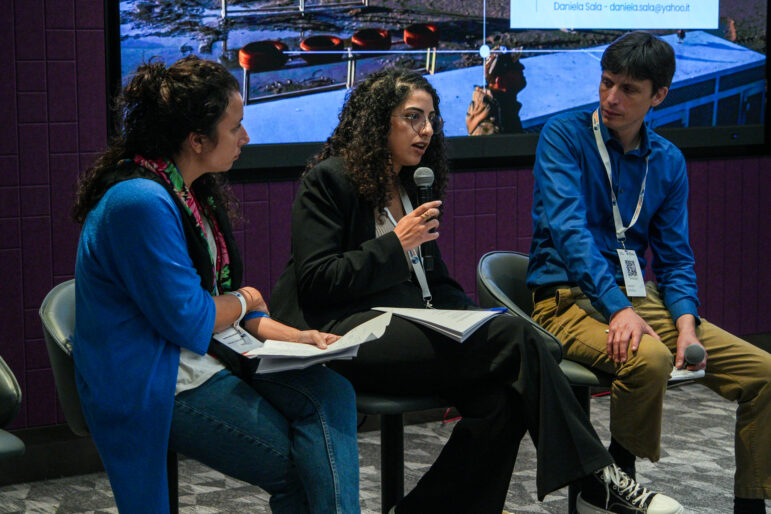

Hala Nouhad Nasreddine, head of Daraj Media's investigative unit, Sara Manisera, co-founder of FADA Collective, and Will Evans, senior reporter at The Examination, (left to right) speaking at an Investigating Global Health breakout session at GIJC25. Image: Zahid Hassan for GIJN
The eyes of the Burning Skies investigation’s reporters started to sting soon after they arrived in Afam-Ukwu, a village east of the city of Port Harcourt, Nigeria. Then came the mild dizziness, headaches, and pressure in the chest. For hours, they had difficulty breathing.
The air felt like a furnace fired by the flames shooting into the sky, day and night, from a former Shell facility on the outskirts of Port Harcourt. Locals said the reporters would get used to it, just as they had, even though some were paying the price with their health.
Across the Middle East and Africa, investigative reporters are connecting environmental degradation to the human toll on communities that live in the periphery of oil and gas facilities.
Through a combination of satellite data and health and scientific studies, supplemented with on-the-ground health reporting, these journalists suggest oil and gas industries are not only causing environmental degradation, but also shaping patterns of illness. The investigators shared tactics and lessons from their investigative work with delegates at an all-day workshop on how journalists can report on the intersections of climate change and public health at the kick-off of the 14th Global Investigative Journalism Conference (GIJC25) in Malaysia.
Breathing in Hellfire
Burning Skies, a year-long cross-border, collaborative investigation revealed that companies, including BP and ExxonMobil, understated flaring emissions across Africa and the Middle East, obscuring damage to the environment and people’s health.
The Environmental Investigative Forum (EIF), European Investigative Collaborations (EIC), Daraj Media, SourceMaterial, Oxpeckers Center for Investigative Environmental Journalism, and nine other media partners spent more than a year analyzing flaring emissions in 18 countries from 2012 to 2023. JournalismFund, which supported the project, described it as the largest investigation on this topic to date. The investigation resulted in 26 stories published in multiple languages, including English, French, German, Arabic, and Italian.
“For the first time, we started to expose the individual responsibility of each oil and gas company involved in this practice,” said Hala Nouhad Nasreddine, investigative coordinator at Daraj Media Lab.
At the time of publication, European oil and gas companies ranked among the top 10 flaring sources in Africa and the Middle East region, according to the investigation.
Nasreddine stressed that data alone could not reveal the loss to both the environment and communities.
“The data files we received were very abstract, all Excel sheets and numbers. It doesn’t reveal what’s really at stake,” she explained. “You need the human story to connect with people and show what’s truly at risk. We found ecosystems being affected, families losing members.”
One of Daraj’s reports from southern Iraq for the investigative series documented children suffering from painful skin diseases and a nine-year-old who had lost a kidney to cancer, and their families’ fears that these health impacts are linked to emissions from nearby oil fields.
Damaging Health and the Environment
Near one of the world’s largest flaring oil fields in Basra, Iraq — a nation already ranked among the world’s most climate-vulnerable — communities live with chronic illness.
Iraq Without Water, a multimedia, online documentary by Italian reporting collective FADA, follows young Iraqi environmentalists and water defenders fighting for their right to clean water. The story traces the growing drought threatening Iraq’s major waterways — the Tigris, the Euphrates, and the Mesopotamian marshes — and how climate change and international oil and gas companies are exacerbating the problem.
“All the NGOs were publishing reports about the lack of water, the climate crisis, but Iraq also has the world’s fifth-largest proven oil reserves in the world,” said Sara Manisera, investigative journalist and co-founder of FADA Collective. “At one point, we were asking ourselves: how is it possible that nobody is linking the lack of water in Iraq with the oil and gas industry there?”
“A lot of people mention climate change without connecting the dots and without mentioning who is responsible,” Manisera noted. “It’s not an alien coming from Mars, it’s an economic decision.”
The investigations featured in the GIJC25 workshop outlined a pattern that echoes across the Middle East and North Africa: pollution data may show emissions rising into the sky or water extraction levels, but the real story lies on the ground in the cancers, breathing problems, and grieving families left behind.
Linking the Health Issues
As more newsrooms investigate the human cost of the climate crisis, a core challenge remains: how to convincingly link environmental degradation from polluted air and contaminated water to health illnesses. Both of these stories required science, data analysis, and community trust to secure and validate information that was unavailable or could not be readily accessed.
To secure accurate and defensible data, the Burning Skies team spent months interrogating satellite imagery, comparing year-on-year emissions, and attributing the volumes of emissions to different country regulations.
These findings were cross-referenced against public health research, including a report by the Clean Air Task Force, which found that 10 million people in 18 oil-exporting nations live within five kilometers (three miles) of active flare sites.
Testimonies and observations from healthcare professionals and experts were also crucial in establishing links. Both investigation teams said they secured this kind of information by winning the trust of sources over a period of intensive field work. After the Iraq Ministry of Health denied FADA’s request to visit a children’s cancer hospital funded by Italian-owned, multinational energy company Eni, for example, a doctor granted the team access, while a whistleblower from the Ministry of Agriculture shared confidential local government reports about water contamination.
Cross-Border Collaborations for Amplification and Accountability
Securing both sides for environmental investigations can be challenging when powerful companies stonewall reporters and make accountability feel out of reach, the journalists in the workshop said. Unequal access by country made cross-border collaboration not just useful, but essential.
“Even in these projects, when you have the EIC reach out to oil companies, we receive a response,” explained Nasreddine, who is based in Lebanon. “But when we, as local reporters, reach out to these companies, we don’t receive a response.”
To amplify the results of their findings, the teams found that publishing only in affected communities was not enough, especially in countries where regulation is weak and multinational corporations are quick to deflect blame to local operators. The teams coordinated parallel releases in different languages in Europe and in affected countries. They also targeted publication in European countries where the oil giants are based to reach corporate boardrooms where reputation matters.
“I can’t say our work changed someone’s life, because it’s not fair to say that,” said Manisera. “What we can do is at least write a story and shine a light on those companies that are putting profit over life.”

